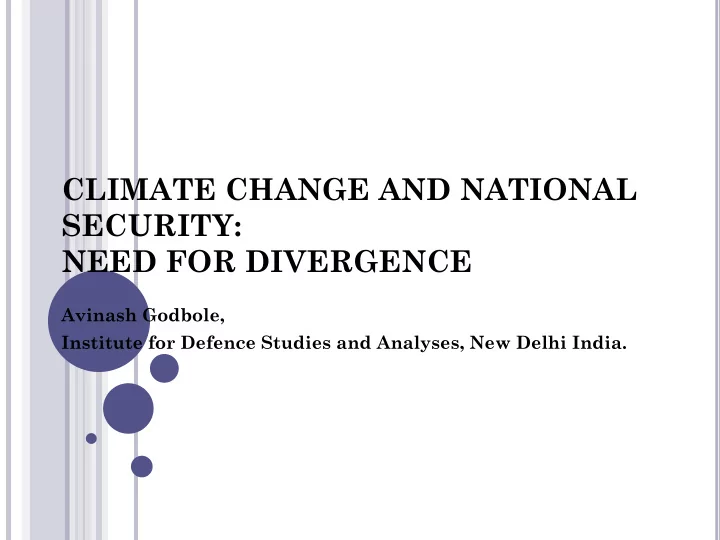

CLIMATE CHANGE AND NATIONAL SECURITY: NEED FOR DIVERGENCE Avinash Godbole, Institute for Defence Studies and Analyses, New Delhi India.
STRUCTURE OF THE PAPER Understanding Security Debate on Climate Change Problems in Using National Security framework for addressing Climate Change Possible Alternatives Core Question : In the present scenario, is it Climate Change debate that is influencing the approach to national security or is it the other way round?
UNDERSTANDING SECURITY Conventionally defined in territorial terms Other elements include people, government and sovereignty During Cold War 5 th element was ideology; Reinvention of security studies- new answers required for questions of ‘security from what?’ and ‘security of what?’ Diverse forms of new security areas- human, food, community and so on Move from state focussed to individual oriented, also called bottom up approach
DEBATE ON CLIMATE CHANGE Very complex debate About past vs. present, and national vs. per capita data Highly politicised It is not about climate alone, its also about economics, trade, development, distribution and so on The debate is about taking responsibility
DEBATE ON CLIMATE CHANGE Core question is about energy and energy intensity, nothing is achievable unless this is addressed However, energy was the core of politics of the 20 th Century; Yergin called history of the 20 th Century as quest for oil, money and power Thus, climate change is the unintended outcome of the power relations of the last century and any real solution will perhaps alter the power relations and the geopolitical map of the world
CLIMATE CHANGE AND NATIONAL SECURITY: UNHOLY MATRIMONY From the perspective of IR theory, expansion of security definition is criticised as dilution of the concept National security framework: the core understanding is that states can not cooperate with each other, if one state looks at climate change as national security issue, its neighbours are bound to be suspicious of its actions Addressing climate change is basically about cooperation, otherwise there is no solution; this is not my problem or your problem, this is our problem
NATIONALISM It is exclusive in nature, based on identity. Thrives on a sense of victory Boundary between positive and negative nationalism is thin, tight rope walk for leadership; can not be sure on how it will impact Nationalism limits the scope of what a good government is supposed to do; on Climate Change it will limit how much a state can get its people to do for reducing the impact
NATIONALISM SCENARIOS Weak state and powerful sense of nationalism among the masses can lead to anarchy In a democratic setup, opposition might use it against ruling party if it is seen to be too soft on sovereignty, for example in negotiating positions In authoritarian state, leader could encourage it to extend its legitimacy N ationalism is self righteous, tends to look for outside faults and ignore issues within
TECHNOLOGY NATIONALISM There is not quick fix technology for climate change solutions Even then, the often discussed technology transfers have not taken place Developing countries can not afford expensive technology with limited timeframe while the developed world continues to emit more than the baseline There is criticism of the technological development in the developing countries
METHODS OF NATIONAL SECURITY Methods of national security can not ensure adaptation to climate change Military power, core of national security apparatus can not be used for achieving climate change targets Means and ends debate, not possible to use armed force to ensure water security, it will be counterproductive Environmentally stressed state is more likely to implode; war can happen only if there were a military coup or a tyrant leader who would benefit from war
SCENARIO Prolonged environmental stresses distress violence interstate war In this case the time gap between the stages will determine if at all there is war, which can be analysed using Levels of Processing approach to identify decision making process
ALTERNATE SCENARIOS Need to focus on individual and collective action at the ground level and global targets at upper level Climate solutions is the best game scenario, it can achieve best results if played fairly but it must involve give and take Addressing the role of present economic methods, speculative markets and food prices
ALTERNATE SCENARIOS Surrogate emissions is a critical issue; Low cost economy carries the burden of consumption elsewhere and relative deprivation continues Equitable and participatory solutions required; it will need new intellectual tools, business strategies and entrepreneurial and leadership approaches
CONCLUSION National approach can not solve a global concern It will do harm to both in the longer run This can harm national security in the longer run of all the states involved if national security framework is not kept aside right away
THANK YOU!
Recommend
More recommend